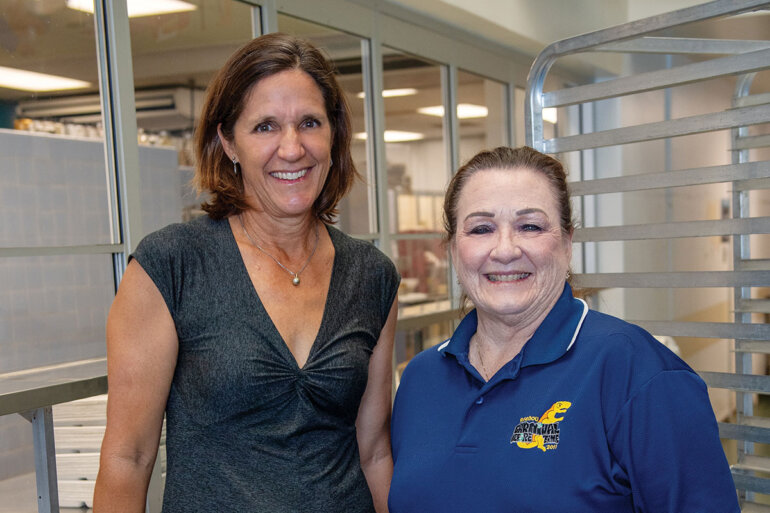Director of Cafeteria Services
– By Debbie Millikan, Director of Sustainability
My inaugural Partners in Sustainability column received a warm welcome from the buff ’n blue community. It debuted in the Winter 2024 Punahou Bulletin this January, featuring Punahou’s Director of Physical Plant Nate Armour. I was delighted with the positive feedback, though not surprised, given the School’s inherent interest in sustainability.
For this column, I chose to highlight Marcia Barrett ’74 Wright, director of Cafeteria Services – someone who is an avid supporter of sustainability and a faithful ally. She holds a powerful lever since food is inextricably tied to climate change. Colleagues in this field often say: If we get food systems right, then sustainability has a chance.
“I do feel sustainability is very important and a necessary step to save us, our future and our children’s future, and save our planet.”
— Marcia Barrett ’74 Wright
Director, Cafeteria Services
Marcia has been at the forefront of important changes during her 35-year tenure at the School. Her involvement in sustainability took flight in 2007, when she spearheaded strategic sustainability upgrades in the kitchen, leveraging technology and adjusting menus to align with Punahou’s commitment to reduce waste and serve healthy foods. The transition from styrofoam and plastic disposable packaging to compostable and biodegradable alternatives marked a turning point, making Punahou one of the first schools to adopt such practices.
One of the most memorable sustainability projects for Marcia emerged when questions from students arose about the environmental impact of selling bottled water when filtered water stations were readily available on campus. She navigated a complex decision-making process. The students’ compelling case resulted in a significant shift: Punahou eliminated the sale of bottled water, a move that underscored the power of collective action.
Fast-forward to today and Marcia continues to be a champion for sustainability, advocating for further reduction of waste, purchasing local products and building relationships with local producers and food hubs – to facilitate sourcing locally-grown ingredients.
Despite these victories, Marcia acknowledges that the hurdles propped by convenience-culture are complex. While waste reduction through washable trays and utensils has been successful in Omidyar and Kosasa dining for grades K – 5, there have been challenges to implementing these measures in upper grades. As Marcia reflects on the past three decades in food service, she expresses concern about the continued reliance on packaged foods. In the face of societal norms favoring convenience, she highlights the importance of providing students with the space, time and support for alternative dining practices.
As she preps for retirement this spring, Marcia reiterates her belief in the significance of sustainability as a crucial component of Punahou’s educational mission, “I do feel sustainability is very important and a necessary step to save us, our future and our children’s future, and save our planet.”
As a forward-looking institution, Punahou has a unique responsibility to instill in students a sense of responsibility for the planet and an understanding of how their choices shape a more sustainable future. Marcia’s journey encapsulates the complexities, triumphs and ongoing commitment to sustainability, emphasizing that the path to a greener future requires ongoing collaboration, innovation and thoughtful consideration of the challenges that lie ahead.

